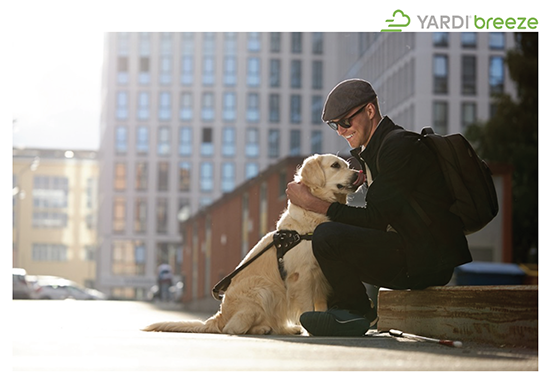Can Unauthorized Assistance Animals Visit Your Community?

The Yardi Breeze team stumbled across a question on a popular multifamily discussion group. It was a simple question, but it set off a flurry of responses. A property manager discovered one of her residents had been keeping an unauthorized dog in the community. They confronted the resident, who said, “This is my partner’s emotional support animal.” The resident’s partner, as you might have guessed, was not on the lease.
So, does the resident’s partner’s assistance animal have a right to be on the property? Or is the property management office within their rights to deny the guest’s animal? After all unauthorized pets are not allowed on-site and the guest is not on the lease.
How we got our answer
Given that an emotional support animal (ESA) is not classified as a pet, it’s all too easy for a property manager to respond to this situation the wrong way. Luckily, we were able to get in touch with Victoria Cowart, Director of Outreach and Education at PetScreening, CPM and NAAEI faculty member. A well-known thought leader in the industry, she’s an expert for anything and everything you want to know about assistance animals.
She tells us exactly what this property manager should do. Her answer comes from 42 U.S. Code § 3604 – Discrimination in the sale or rental of housing and other prohibited practices. The relevant excerpt reads as follows:
As made applicable by section 3603 of this title and except as exempted by sections 3603(b) and 3607 of this title, it shall be unlawful:
(f) (1) To discriminate in the sale or rental, or to otherwise make unavailable or deny, a dwelling to any buyer or renter because of a handicap of —
(C) any person associated with that buyer or renter.
Does a guest’s ESA need to be on the lease to enter a resident’s apartment?
As for a guest’s assistance animal, it’s the guest’s association with the renter that matters. The resident asking about their partner’s animal should make a request for reasonable accommodation on behalf of that other person. Remember, residents on a lease can make a request for reasonable accommodation for themselves or their guests.
In a perfect world, the request for accommodation would be made prior to the guest visiting the property with their animal. But we know the way this industry works is in reverse. We usually come across the problem first, then we have to address it. Ultimately, residents are allowed to make a request for reasonable accommodation on behalf of their guests.
Can a property manager deny someone’s assistance animal when that person isn’t even on the lease?
I used to think the same thing when I was in operations. But when you look at the Fair Housing Act, it covers any person associated with the resident. [Note the aforementioned legal citation.]
Many such cases have been adjudicated. One particular case stands out in my memory. There was a mother living in a community, and she wanted her daughter, who has a disability, to be able to bring her assistance animal with her. The property manager felt the FHA only applied to assistance animals belonging to the resident, not guests. The court ruled in the mother’s favor.
Does the Fair Housing Act apply equally to service and emotional support animals in these cases?
Yes, the FHA applies equally to both service and support animals, jointly referred to as assistance animals. In the case I just mentioned about the mother and her daughter’s assistance animal, it’s the mother’s fair housing rights that matter. It’s worth noting that this is not an ADA issue. Because if we were looking at ADA, only common areas open to the public and service animals would be covered. But what we’re talking about is the Fair Housing Act, which covers all assistance animals: service and support animals.







